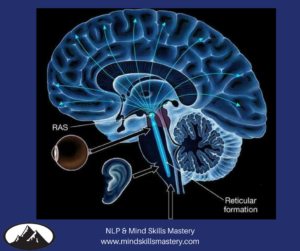RAS – a Beautiful Bundle of Neurons
What are you paying attention to? What are you noticing? And how do you get to choose where to place your attention? Focus flows where your mind goes, or does it?
The reticular activating system, or RAS, is a bundle of neurons that starts close to the top of the spinal column and extends upwards around two inches. All of your senses (except smell, which goes to our brain’s emotional centre) are wired directly to this bundle of neurons that’s about the size of your little finger.
This little bit of brain matter is responsible for filtering the massive amounts of information your sensory organs are constantly throwing at it and selecting the ones that are most important for your conscious mind to pay attention to.
It makes sure your brain doesn’t have to deal with more information than it can handle. The reticular activating system plays a big role in the sensory information you perceive daily. It decides for you what is relevant and what is not worth your attention.
Have you ever bought a car that you perceived as uncommon, then suddenly noticed quite a few of the same make, model and colour on the road. Before Aaron bought his Jaguar Estate, I had never seen one. Now I notice them on the road on a weekly basis. Have you ever visualised getting a car park in a busy part of the city, and got one – just like that?
So how does the RAS decide what else is relevant? Its based on your survival, beliefs and experiences – or the programmes it runs.
There are certain types of information that always seem to get through the gates of the RAS: for example, the sound of your name being called, anything that threatens your safety or that of your loved ones, or an indication from your partner concerning sex. Our brains are wired to bring these things to the very top of our consciousness because they’re considered highly important.
The wonder of neuroplasticity – our brains ability to change, is that we can change the selection criteria or RAS filter. We do this through setting intention, visualisation and mental rehearsal, and the language patterns we use. The NLP Well-formed Outcome process, when applied well, is a great way to do this as it requires multi sensory rehearsal. The RAS can also be changed through Self Editing in the evenings.
Because the Well formed outcome is an intention and outcome setting pattern, it also changes what you (or your RAS) is bringing to your conscious attention. Before I go into meetings or Aaron and I go into workshops we will set our intention not only for ourselves, but for the day, for our students, for the outcomes we intend to create.
Here is an easy process for setting your intent around certain goals and your future:
- Think of the outcome or situation that you would like to set your intent for.
- Set the intention for yourself in terms of the experience that you want to have in that situation, or in achieving your goal. What would you like to have happen?
- Mentally rehearse what you will be like in that ideal, future situation. What are you hearing? What are you saying to yourself? What are you seeing and what are you feeling? Step into those pictures, feel the feelings or hear the sounds as if its happening.
- If it’s a goal you’re focusing on, repeat at least once a day, or more if possible
Creating and mastering your future happens so much faster when you use your mind’s beautiful bundle of neurons.
About the Author Karren Kerrisk
Karren is the Principal NLP Trainer and Coach for Mind Skills Mastery. She has a background in Personal and Professional change, and has enabled many clients to achieve life changing results in their relationships, careers and finances. Karren is an internationally certified New Code NLP Trainer and member of the International Coaching Federation.

